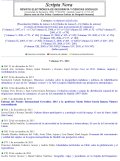Discourses of insecurity and urban renewal policies among local residents: An anthropological approach to the case of the “old neighbours” and the ARI-Lavapiés (Madrid)
Keywords:
urban renewal policies, ethnography of “urban insecurity”, Lavapiés, MadridAbstract
Lavapiés, a central neighborhood in Madrid, has been defined as “Preferential Renewal Area” (ARI) for more than ten years, in the context of public policies for urban renewal. As specific policies, ARIs were developed in the main Spanish city centers from the 80´s, after a diagnosis of “urban crisis” and “urban unsafeness” shared by residents, civil associations, public servants and local politicians. After all these years the ARI-Lavapiés has been unable to eliminate the strong feeling of lack of safeness, which exists among the old residents of the neighbourhood. From an ethnographical approach to the discourse and experience of insecurity among this group of local residents, I will show how anthropology, and the use of qualitative research methods in general, can contribute to urban discussion about public policies evaluation.Downloads
Published
2012-03-13
Issue
Section
Articles
License
Los autores que publican en esta revista están de acuerdo con los siguientes términos:
- Los autores conservan los derechos de autoría y otorgan a la revista el derecho de primera publicación, cin la obra disponible simultáneamente bajo una Licéncia de Atribución Compartir igual de Creative Commons que permite compartir la obra con terceros, siempre que estos reconozcan la autoría y la publicación inicial en esta revista.
- Los autores son libres de realizar acuerdos contractuales adicionales independientes para la distribución no exclusiva de la versió de la obra publicada en la revista (com por ejemplo la publicación en un repositorio institucional o en un libro), siempre que se reconozca la publicación inicial en esta revista.





